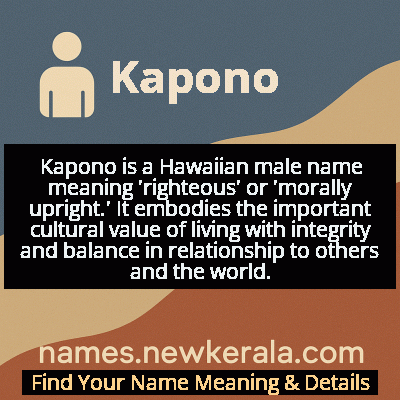Kapono Name Meaning & Details
Origin, Popularity, Numerology Analysis & Name Meaning of Kapono
Discover the origin, meaning, and cultural significance of the name KAPONO. Delve into its historical roots and explore the lasting impact it has had on communities and traditions.
Name
Kapono
Gender
Male
Origin
Hawaiian
Lucky Number
9
Meaning of the Name - Kapono
Kapono is a Hawaiian male name meaning 'righteous' or 'morally upright.' It embodies the important cultural value of living with integrity and balance in relationship to others and the world.
Kapono - Complete Numerology Analysis
Your Numerology Number
Based on Pythagorean Numerology System
Ruling Planet
Mars
Positive Nature
Generous, passionate, energetic, and humanitarian.
Negative Traits
Impulsive, impatient, moody, and can be overly emotional.
Lucky Colours
Red, maroon, scarlet.
Lucky Days
Tuesday.
Lucky Stones
Red coral, garnet.
Harmony Numbers
1, 2, 3, 6.
Best Suited Professions
Military, sports, philanthropy, leadership roles.
What People Like About You
Courage, energy, leadership, generosity.
Famous People Named Kapono
Kapono Beamer
Musician
Preserved and promoted traditional Hawaiian music through performances and recordings
Kapono Ka'aihue
Athlete
Played professional baseball in Major League Baseball organizations
Kapono Brown
Musician
Contemporary Hawaiian musician and cultural educator
Name Variations & International Equivalents
Click on blue names to explore their detailed meanings. Gray names with will be available soon.
Cultural & Historical Significance
Historically, names containing 'pono' were often bestowed upon children from chiefly families or those expected to assume leadership roles, as righteousness was considered indispensable for effective governance and community welfare. The name continues to serve as a cultural touchstone in modern Hawaii, symbolizing the persistence of traditional values amid contemporary challenges. For many Hawaiian families, choosing this name represents a conscious effort to maintain cultural continuity and instill important ethical principles in the next generation, making Kapono a living connection to Hawaiian cultural identity and values.
Extended Personality Analysis
Individuals named Kapono are typically characterized by their strong moral integrity and sense of justice. They often display natural leadership qualities combined with a calm, balanced demeanor that inspires confidence in others. These individuals tend to be peacemakers who value harmony in relationships and frequently serve as mediators due to their fair-minded approach and ability to see multiple perspectives. Their commitment to doing what's right makes them reliable and trustworthy companions who others naturally turn to for guidance and support.
Kapono's often demonstrate deep connection to their cultural heritage and may show particular interest in community welfare and preserving traditions. They typically possess a quiet confidence that commands respect without being authoritarian, combined with practical wisdom that helps them navigate complex situations with grace. While firmly principled, they usually express their convictions with consideration for others' viewpoints, making them effective in collaborative environments. Their personality reflects the Hawaiian ideal of living pono - in right relationship with people, nature, and spiritual values - which often manifests as environmental consciousness, community involvement, and cultural stewardship.
Modern Usage & Popularity
In contemporary naming practices, Kapono maintains strong cultural relevance within Hawaiian communities while remaining relatively uncommon in mainstream American naming trends. The name enjoys consistent usage in Hawaii, particularly among families seeking to honor their cultural heritage and instill traditional values in their children. While it doesn't rank among the top 1000 names nationally in the United States, it holds regional significance in Hawaii and among the Hawaiian diaspora community. Modern usage often reflects a deliberate choice to preserve cultural identity and pass on important ethical principles. The name has gained some additional visibility through famous bearers in music and sports, contributing to its continued relevance and occasional adoption by non-Hawaiian families attracted to its meaningful connotations and pleasant sound. Current trends show stable usage with occasional spikes following cultural events or prominent media appearances by individuals bearing the name.
Symbolic & Spiritual Meanings
Symbolically, Kapono represents the eternal pursuit of moral excellence and living in accordance with natural and spiritual laws. The name embodies the Hawaiian philosophical concept that true fulfillment comes from maintaining balance and righteousness in all aspects of life. It serves as a symbolic bridge connecting traditional indigenous wisdom with contemporary existence, reminding us that ethical living involves both personal integrity and responsibility to the community. Metaphorically, Kapono can be understood as representing a moral compass - someone who provides direction and stability through consistent adherence to principles of justice and fairness. The name also carries deeper symbolic meanings related to cultural preservation, representing the ongoing vitality of Hawaiian values and the importance of maintaining ethical traditions in modern society. It symbolizes the ideal of living in right relationship with all beings and the environment, reflecting the interconnected worldview central to Hawaiian culture.

